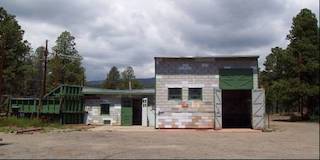In honor of the 5th anniversary of the Manhattan Project National Historical Park, AHF is pleased to make its documentary film A Sense of Place available online.
In 2006, the Los Alamos National Laboratory had just completed the restoration of the “V Site” (photo). Located in a secure area of the laboratory, the “V Site” was where the “Gadget,” the plutonium bomb tested at the Trinity site, was designed. The film introduces audiences to the “V Site” and the other properties that played important roles in the Manhattan Project at Los Alamos.
Richard Rhodes, Pulitzer Prize-winner author of the “Making of the Atomic Bomb,” explains how discovery of fission in late 1938 led to a race to create an atomic weapon in World War II. A student at the Los Alamos Boys Ranch School in 1942, Sterling Colgate recalls J. Robert Oppenheimer visiting the campus as a possible site for the proposed laboratory. Even though Oppenheimer was traveling incognito, Colgate quickly recognized his porkpie hat.
First-hand accounts by Nobel Laureate Hans Bethe and other physicists give audiences a sense of what it was like to work on the project. Phil Morrison describes the laboratory in August 1944 as “Intense concern, intensity of work, intensity of hope, intensity of wonder…didn’t know what was going to happen next. We felt like soldiers enlisted to win this battle…everything would have to go.”
The film provides a tour of the properties that are part of new Manhattan Project National Historical Park in Los Alamos. Because of on-going top-secret work, most of the sites located behind the security perimeter are not yet accessible on a regular basis. In the meantime, enjoy a chance to take a virtual tour through this documentary!





